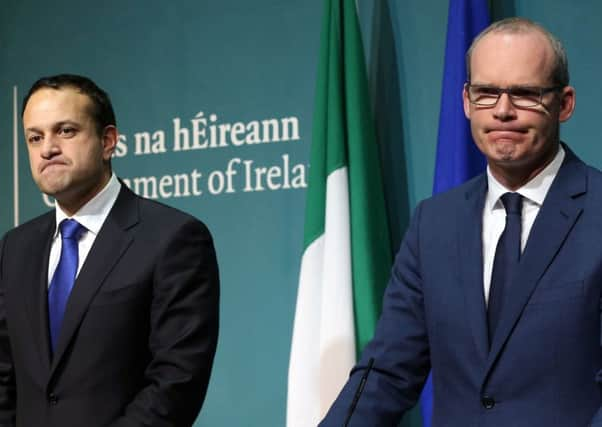Brexit: Irish premier describes commitment to free-flowing border as '˜rock solid'


Leo Varadkar described assurances outlined in the agreed text as “politically bulletproof”.
“We have protected what we sought to protect and we achieved what we sought to achieve,” he said.
Advertisement
Hide AdAdvertisement
Hide AdReacting to the breakthrough at Government Buildings in Dublin, the Fine Gael leader downplayed changes in the wording of the text from Monday’s ill-fated draft, which was scuppered by the Democratic Unionists.
He said the amendments were “stylistic changes in language” or “just statements of fact” that his government had “no difficulty with”.
The Taoiseach acknowledged relations between the UK and Ireland had become strained during the phase one negotiations but he predicted that now his government has achieved the desired guarantees on the border it would become one of London’s “closest friends” in the next stage of the Brexit talks.
In regard to the ratification of a potential final Brexit deal, Mr Varadkar said he did not think it would require a referendum in Ireland.
Advertisement
Hide AdAdvertisement
Hide AdThe Taoiseach said Friday’s phase one agreement marked a “very significant day” for Ireland.
“This is not the end, but it is the end of the beginning,” he added.
“And we will remain fully engaged and vigilant throughout phase two, the drafting and ratification of the new treaties that will be required between the EU and UK and their implementation.”
Mr Varadkar said the UK’s commitment to maintain regulatory alignment with the EU on cross-border issues was welcome, but he stressed that was a “backstop” position and the desire of London, Dublin and Brussels was a wide-ranging trade deal that would enable free access between Ireland and the whole of the UK.
Advertisement
Hide AdAdvertisement
Hide AdMr Varadkar hailed the commitment to avoid any controls, checkpoints or infrastructure on the border.
He said the deal had protected the Good Friday Agreement and the rights of people in Northern Ireland to be Irish, and therefore EU, citizens.
Mr Varadkar said the century-old Common Travel Area would be maintained and citizens of each nation would continue to have “freedom to live, work, study, access housing, healthcare, pensions and welfare” in each country.
He also welcomed the continuance of EU peace funding for communities on both sides of the border until at least 2021.
Advertisement
Hide AdAdvertisement
Hide AdThe Taoiseach said the deal was good news for all the people of Northern Ireland, and tried to assure unionists that he and his government did not have a “hidden agenda”.
“There is no question of us exploiting Brexit as a means of moving to a united Ireland without consent,” he said.
“We do not want to see a border in the Irish Sea, any more than we want to see a border between Newry and Dundalk or between Letterkenny and Derry.
“We want to build bridges, not borders.
“We want free travel and free trade to continue as it does now and has done for 20 years. We want reconciliation and respect to grow.
Advertisement
Hide AdAdvertisement
Hide Ad“Our guiding light - and our only ambition throughout - has been to ensure that the provisions of the Good Friday Agreement continue to operate in full after Brexit, and that people can go about their normal lives and business as before.”
He told nationalists living north of the border that the Irish government had ensured their rights had been protected.
“There will be no hard border on our island,” he told them. “You will never again be left behind by an Irish government.”
Mr Varadkar thanked fellow EU states for the solidarity shown to Ireland in the talks.
Advertisement
Hide AdAdvertisement
Hide Ad“It is the clearest possible illustration of the values of the European Union and why small countries are better off in a big union,” he said.
“It puts beyond any doubt that our future lies in the European Union at the heart of the common European home that we helped to build.”
Tanaiste Simon Coveney, Ireland’s deputy premier, said the retention of a specific Irish stream in phase two of the negotiations was a recognition that Ireland was the “most exposed and most vulnerable” of the remaining EU nation states to Brexit.
“I suppose there’s an irony in the fact that the result that we want after all of these negotiations is as close to the status quo as possible, but that is what we want,” he said.